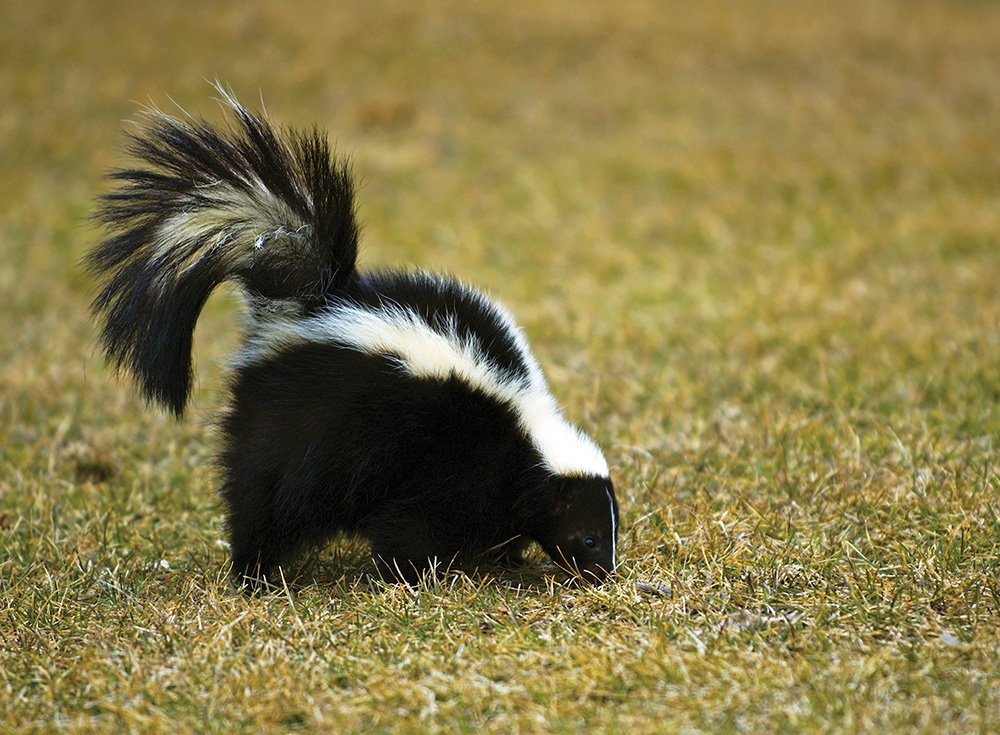
By Richard Bauman
Skunks aren’t ferocious, but they can be dangerous, and it’s the rare person who wants to meet up with one.
They are notorious, of course, for the overpowering, stomach-turning odorous mercaptan they produce, which you definitely want to avoid. And it’s reasonably easy to avoid being sprayed if you encounter a skunk.
Skunks are nocturnal, and you’re most likely to encounter one at dusk or at night. They don’t go around looking for animals or humans to spray, and often use an elaborate warning ritual before letting go with a blast of mercaptan. They will:
- stand still
- stamp their front feet
- hiss and shake their head from side to side
- raise their tail straight up
By the time the skunk raises its tail, if you haven’t backed off, you probably won’t escape unscathed.
North America is home to two types of skunks — the striped skunk, and the spotted skunk. And both call Alabama home.
Striped skunks are the larger of the two (about the size of a house cat), with black fur and one or more white stripes running from head to tail. Spotted skunks are smaller, but no less potent, are reddish colored with random “body bands” of white fur that give them their spotted appearance.
Spotted and striped skunks spray mercaptan from musk glands at the base of their tails. After going through its warning ritual, the striped skunk quickly turns around, arches its back and blasts some mercaptan at its target.
Spotted skunks use a “handstand” method of spraying. They stand on their front paws, hold their hind legs in the air, and with tail arched shoots a stream at their target. The spotted skunk can hold its handstand for five seconds, which is plenty of time to aim and spray.
Whether mercaptan is from a spotted or striped skunk matters little. Both are yellowish in color, and need to be washed off promptly, or the stench will last for days on skin, hair and clothes of humans, and on the fur and skin of animals.
De-skunking products are available or make your own
Pet stores, sporting goods stores and even Walmart sell de-skunking products. The go-to home remedy for de-skunking humans and animals was discovered by chemist Paul Krebaum. It chemically neutralizes the skunk odor, but it must be made up fresh.
It’s a mixture of:
- one quart 3 percent hydrogen peroxide
- ¼ cup of baking soda
- 1 teaspoon liquid dishwashing detergent
If your pet gets skunked, the Humane Society of the United States recommends:
- Keep the pet outdoors
- Mix up the hydrogen peroxide solution, or use a commercially available product
- Clean vigorously and rinse thoroughly
- Shampoo your pet
- Use the solution to get rid of any mercaptan you might have accidentally gotten on you or your clothes.
Keep skunks from moving in
According to experts at the University of California Integrated Pest Management Program, and the Alabama Cooperative Extension System’s Wildlife Damage Management Program, skunks are attracted to places where they can readily find food, water, and shelter. They will live in burrows, but they are also like:
- old buildings
- hollow trees
- spaces under porches, decks, and crawl spaces under houses
- wood piles
To prevent skunks from moving in on your property, make it unattractive to them:
- remove piles of wood or junk from the area
- stack firewood tightly, and at least 18 inches above the ground
- seal garbage cans and secure pet food bins
- use insecticides to control grubs and lawn pests
- reduce potential food sources such as fallen fruit and spilled seed from bird feeders
- remove food placed outdoors for pets by nightfall
- install fencing that extends below ground at least twelve inches around buildings and seal your foundation.
If a skunk has already made a home under your house or elsewhere, proceed with caution. It is probably best to hire a wildlife removal specialist. These experts can remove resident critters, and “skunk proof” areas favored by skunks.
According to the Professional Wildlife Removal website, skunk repellent products you spray or sprinkle about your property aren’t effective. “Wildlife experts insist that habitat modification and removal are the only effective ways of preventing skunks. Several repellent substances are available … (but) Most do not keep away skunks.”
Skunks are usually considered unwelcome, but skunks do their part to control other pests. They eat grasshoppers, crickets, mice, salamanders, tobacco and tomato worms, snakes, small birds and even small rabbits.
There’s no other animal quite like a skunk. The potent odor it produces is unique. Once you’ve had a nose full of it, you never forget it.
On the other hand, there’s no reason to ever become the target of a skunk’s spray. If you encounter a skunk, give it a lot of room. Don’t make threatening moves toward it, and you probably will never need a peroxide and baking soda bath.




